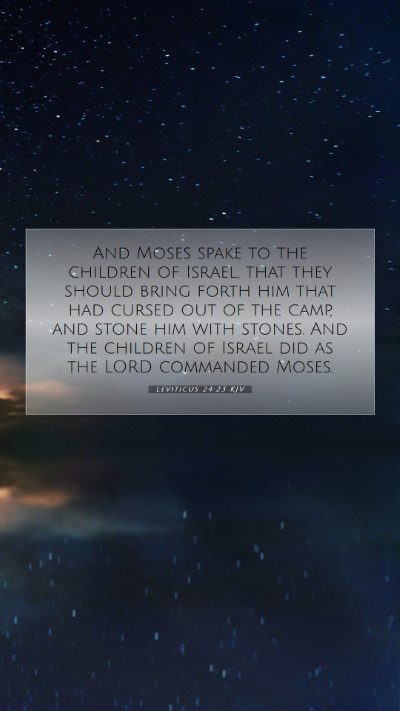Bible Verse Commentary: Leviticus 24:23
Leviticus 24:23 states: "And Moses spake to the children of Israel, that they should bring forth him that had cursed out of the camp, and stone him with stones. And the children of Israel did as the LORD commanded Moses." This verse serves as a significant lesson on the consequences of blasphemy and a reflection of God's holiness.
Verse Meaning and Insights
This verse is part of a chapter that deals with laws concerning the worship and conduct of the Israelite community. It provides profound insights into the nature of divine justice and social order. The incident that leads to this command highlights the seriousness with which God regards His name and the impact of individual behavior on community integrity.
Commentary Analysis
-
Matthew Henry's Commentary:
Matthew Henry emphasizes the gravity of cursing God as a violation of the covenant relationship between God and His people. The removal of the offender from the camp illustrates the need for purity and sanctity within the community. It also underscores the community’s responsibility in upholding God's commandments and the severe repercussions of direct defiance against divine authority.
-
Albert Barnes' Commentary:
Albert Barnes notes that this command was a measure of justice, aiming to deter others from blasphemy. He points out that such actions disrupt social and religious order. By stoning the offender, the Israelites were not only carrying out the judgment but also reinforcing their commitment to maintaining reverence for God among them. Barnes highlights the importance of collective accountability for the community in upholding God’s standards.
-
Adam Clarke's Commentary:
Adam Clarke provides an in-depth historical analysis, commenting on the cultural context of this command. Clarke explains that the consequences for blasphemy are a reflection of the ancient Near Eastern laws where cursing a deity was taken very seriously. He also conveys that this could serve as a reminder for contemporary readers about the significance of divine respect and the need for judgment in maintaining moral standards.
Understanding Scripture: Themes and Applications
Leviticus 24:23 brings forth themes of accountability, justice, and sanctity. In understanding this scripture, it is vital to recognize that the laws given to the Israelites were not merely punitive but were designed to foster a community that honored God.
Key Themes
- Holiness of God: This verse illustrates God's demand for holiness among His people.
- Community Responsibility: It showcases the collective responsibility to enforce divine principles within the community.
- Justice and Punishment: The verse reflects a clear stance on the need for justice against blasphemy.
Practical Applications
The application of Leviticus 24:23 extends beyond ancient Israelite practice into modern-day life, encouraging individuals and communities to uphold integrity and respect for the sacred. In Bible study groups, this verse can serve as a powerful discussion about the importance of reverence in worship and the societal implications of individual actions.
Bible Cross References
- Exodus 22:28: “You shall not revile God, nor curse a ruler of your people.”
- Leviticus 20:27: “A man or a woman who is a medium, or a necromancer, shall surely be put to death.”
- Numbers 15:35: “And the LORD said to Moses, 'The man shall be put to death; all the congregation shall stone him with stones outside the camp.'”
Conclusion
In summary, Leviticus 24:23 offers a multifaceted perspective on divine justice and community responsibility. It encourages readers to consider the weight of their words and actions in relation to their faith. By studying this verse and its surrounding context, one can gain a deeper understanding of the seriousness with which God views covenant relations and the societal structures intended to uphold His holiness.


